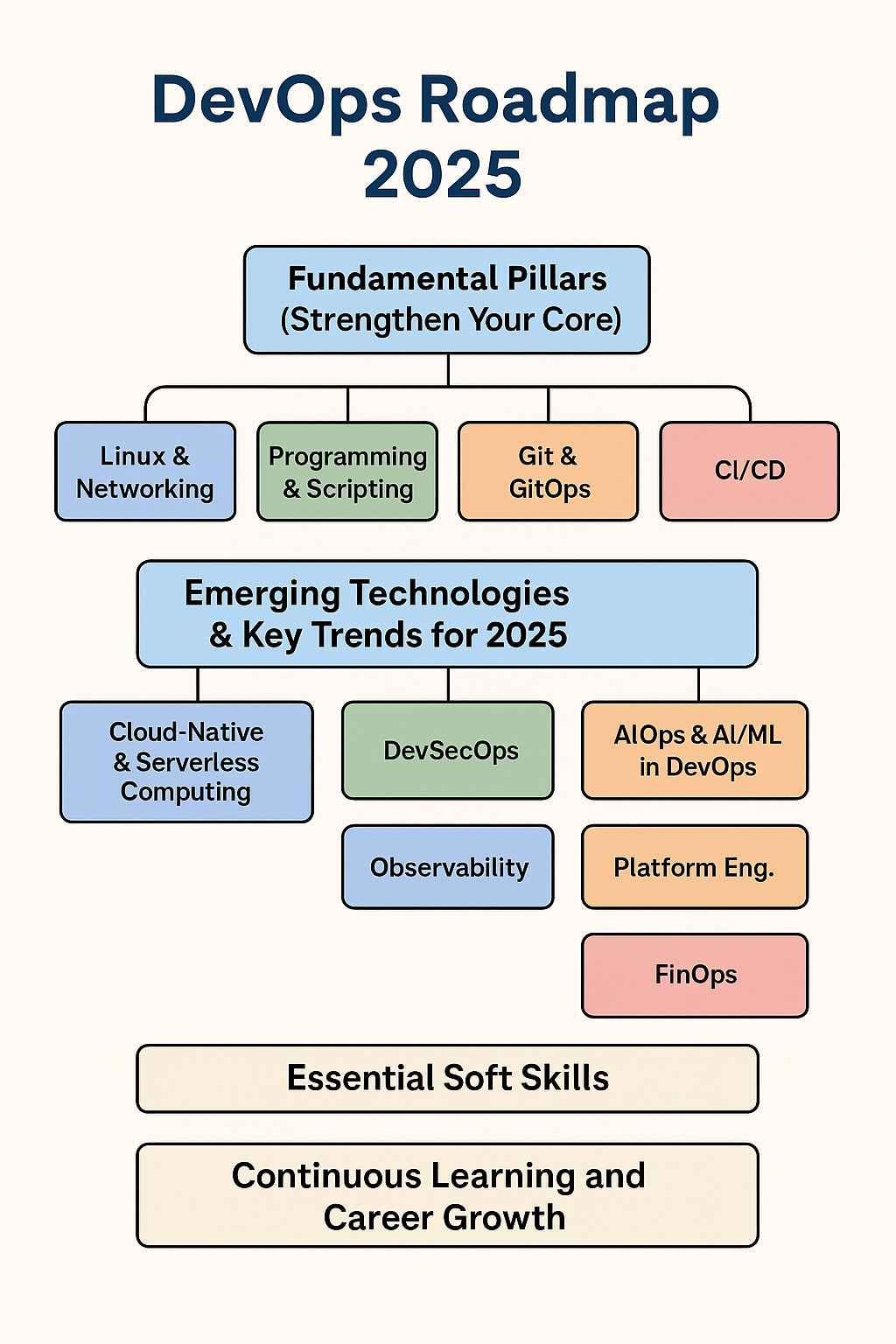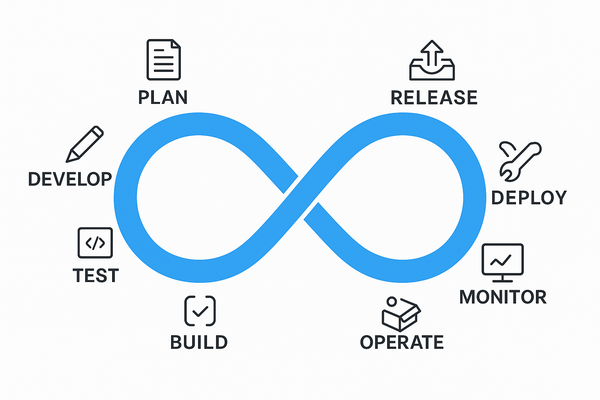DevOps isn’t just a buzzword anymore—it’s the foundation of how modern teams build, test, release, and manage software. In 2025, DevOps roadmap continues to evolve at lightning speed, with a stronger focus on automation, AI, security, and cloud-native tools.
Whether you’re just starting or want to sharpen your edge, this roadmap breaks down everything you need to stay relevant and grow in the DevOps world this year. Here we can read DevOps Roadmap
1. Master the DevOps Basics
Before jumping into trendy tools, you need a strong core. Here’s where to start:
Linux & Networking Skills
- Learn Linux well: Practice shell commands, scripting, managing services, and customizing systems. Most cloud servers run Linux.
- Understand networking: Get a grip on TCP/IP, DNS, VPNs, firewalls, and how everything connects behind the scenes.
Programming & Scripting
- Know at least one scripting language like Python, Go, or Bash.
- These help you automate tasks and write scripts for deployments, monitoring, and more.
Git & GitOps
- Master Git: Learn how to branch, merge, rebase, and resolve conflicts confidently.
- Learn GitOps: Use Git not just for code, but also for deploying infrastructure using tools like ArgoCD or Flux.
CI/CD (Continuous Integration & Delivery)
- Understand what CI/CD really means.
- Try tools like Jenkins, GitHub Actions, GitLab CI/CD, and AWS CodePipeline.
- Learn to add automated tests for code quality, security, and performance.
2. Stay Ahead with 2025 DevOps Trends
The DevOps world is shifting. These are the hot trends you should keep your eye on this year:
Cloud-Native & Serverless
- Be comfortable with at least one cloud: AWS, Azure, or GCP.
- Learn Docker to containerize your apps.
- Master Kubernetes (K8s) for managing large-scale container deployments.
- Explore serverless platforms like AWS Lambda or Google Cloud Functions to run small apps without managing servers.
DevSecOps (Security Built-In)
- Shift security left: Add security checks early in your development process.
- Automate security scans using tools like Snyk, Trivy, or Aqua.
- Use tools like HashiCorp Vault for managing secrets safely.
AI/ML in DevOps (AIOps & MLOps)
- AI is entering DevOps. Learn how it helps detect problems, suggest fixes, or even write automation scripts.
- If you’re into ML, understand MLOps to automate the full lifecycle: data → model → deployment → monitoring.
Observability (More Than Just Monitoring)
- Don’t just watch your systems—understand them.
- Learn tools like Prometheus, Grafana, ELK Stack, and OpenTelemetry.
- Set alerts and track logs, metrics, and traces to quickly catch and fix issues.
Infrastructure as Code (IaC)
- Write infrastructure like code using Terraform, Pulumi, or AWS CloudFormation.
- Use Ansible, Puppet, or Chef to configure and manage your servers.
Platform Engineering
- Big teams are building internal platforms (IDPs) to give developers self-service tools and environments.
- Focus on improving DevEx (developer experience) by automating routine tasks and reducing friction.
FinOps (Cost Management for Cloud)
- Cloud bills can get huge—learn to manage and reduce costs.
- Use cost analysis tools, tag resources, and monitor budgets regularly.
3. Don’t Ignore Soft Skills
Great DevOps engineers are more than just tool experts. These soft skills matter just as much:
- Communication: Explain complex tech in simple terms.
- Collaboration: Work closely with developers, testers, and business teams.
- Problem Solving: Think about systems as a whole.
- Adaptability: Keep learning as tools and trends change.
- User Focus: Remember—your job is to deliver value to users faster and safer.
4. Grow Your Career (Keep Building, Keep Learning)
Build Projects
Hands-on work is the best teacher. Set up CI/CD pipelines, deploy on Kubernetes, or automate cloud infrastructure—even in your personal projects.
Certifications
Boost your credibility with these:
- AWS Certified DevOps Engineer
- Microsoft Certified: DevOps Engineer Expert
- Certified Kubernetes Administrator (CKA)
- Docker Certified Associate
Join the Community
Follow DevOps influencers on LinkedIn, attend meetups or conferences, and contribute to open-source projects. The community is a great place to learn and grow.
Specialize Over Time
As you gain experience, pick an area to go deep:
- DevSecOps
- Site Reliability Engineering (SRE)
- Cloud Architecture
- MLOps
Final Thoughts
2025 is the year DevOps becomes even smarter, more secure, and deeply automated. Whether you’re building your first CI/CD pipeline or managing Kubernetes at scale, there’s a place for you in this fast-growing field.
Start small, stay consistent, and keep learning. The more you experiment and build, the more confident you’ll become.
Next Steps
- Follow our DevOps tutorials
- Explore more DevOps engineer career guides
- Subscribe to InsightClouds for weekly updates
- Devops tutorial :https://www.youtube.com/embed/6pdCcXEh-kw?si=c-aaCzvTeD2mH3Gv

